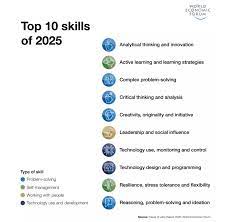The job market is rapidly changing as advances in technology, automation, and artificial intelligence (AI) transform the way we work. While these changes bring new job opportunities, they also raise concerns about job displacement and the need for upskilling and reskilling. In this article, we will discuss the key trends shaping the future of jobs and how individuals, businesses, and governments can prepare for the next era of employment.
The World Economic Forum’s Future of Jobs Report 2020 sheds light on the pandemic-related disruptions and the expected outlook for technology adoption, jobs, and skills in the next five years.
Key Trends Shaping the Future of Jobs
Automation and AI Advances in automation and AI are transforming industries from manufacturing to healthcare. While this technology creates new job opportunities, it also leads to job displacement in certain industries. Jobs that involve routine tasks such as data entry or assembly line work are at the greatest risk of automation.
One of the key findings of the report is that the pace of technology adoption is expected to remain unabated and may even accelerate in some areas. The adoption of cloud computing, big data, and e-commerce remain high priorities for business leaders, following a trend established in previous years. However, there has also been a significant rise in interest for encryption, non-humanoid robots, and artificial intelligence.
Automation, in tandem with the COVID-19 recession, is creating a “double-disruption” scenario for workers. In addition to the current disruption from the pandemic-induced lockdowns and economic contraction, technological adoption by companies will transform tasks, jobs, and skills by 2025. Forty-three percent of businesses surveyed indicate that they are set to reduce their workforce due to technology integration, 41% plan to expand their use of contractors for task-specialized work, and 34% plan to expand their workforce due to technology integration. By 2025, the time spent on current tasks at work by humans and machines will be equal. A significant share of companies also expects to make changes to locations, their value chains, and the size of their workforce due to factors beyond technology in the next five years.
Although the number of jobs destroyed will be surpassed by the number of “jobs of tomorrow” created, job creation is slowing while job destruction accelerates. Employers expect that by 2025, increasingly redundant roles will decline from being 15.4% of the workforce to 9% (6.4% decline), and that emerging professions will grow from 7.8% to 13.5% (5.7% growth) of the total employee base of company respondents. Based on these figures, it is estimated that by 2025, 85 million jobs may be displaced by a shift in the division of labor between humans and machines, while 97 million new roles may emerge that are more adapted to the new division of labor between humans, machines, and algorithms.
Jobs in the healthcare industry such as nursing, medical technicians, and home health aides are expected to experience significant growth due to ageing populations and the increasing prevalence of chronic diseases — especially in developed countries. The rise of remote work has created a need for jobs related to digital communication and collaboration, such as video conferencing and project management. Jobs that require social and emotional skills such as empathy, creativity, and critical thinking will become increasingly important as machines and automation take over more routine tasks.
Gig Work and the Gig Economy
The gig economy has exploded in recent years, with platforms like Uber, Airbnb, and Upwork providing a way for individuals to work on a freelance basis. The gig economy offers flexibility and the ability to work on multiple projects at once, but it also lacks benefits and job security.
Remote Work
The COVID-19 pandemic has accelerated the shift to remote work. While remote work offers greater flexibility and reduces commuting time, it also requires individuals to be self-motivated and self-disciplined. Remote work also has implications for the future of cities and the way we live and work.
Preparing for the Future of Jobs
Upskilling and Reskilling
As job roles change and new industries emerge, individuals must continuously upskill and reskill to remain competitive in the job market. This involves learning new skills and adapting to new technologies. Employers and governments must provide training and education programs to help individuals acquire the skills they need to succeed in the future of work.
Skills gaps continue to be high as in-demand skills across jobs change rapidly. Employers report skills gaps in areas such as problem-solving, critical thinking, creativity, and digital skills. Individuals must continuously upskill and reskill to remain competitive in the job market. This involves learning new skills and adapting to new technologies. Employers and governments must provide training and education programs to help individuals acquire the skills they need to succeed in the future of work.
Embracing Flexibility
The future of work is likely to be more flexible than ever before. Employers must be willing to offer flexible work arrangements, including remote work, gig work, and part-time work. Businesses must also be willing to adapt to new technologies and new business models.
Investing in Infrastructure
As remote work becomes more common, governments must invest in infrastructure to support it. This includes providing high-speed internet, building co-working spaces, and creating incentives for businesses to locate in areas outside of major cities.
Conclusion
The future of jobs is uncertain, but one thing is clear: the job market is rapidly changing, and individuals, businesses, and governments must adapt. By upskilling and reskilling, embracing flexibility, and investing in infrastructure, we can prepare for the next era of employment and create a better future for all.
References and Resources
https://www.millenniumpost.in/k-reers/ceo-speaks-future-proof-your-career-513361
